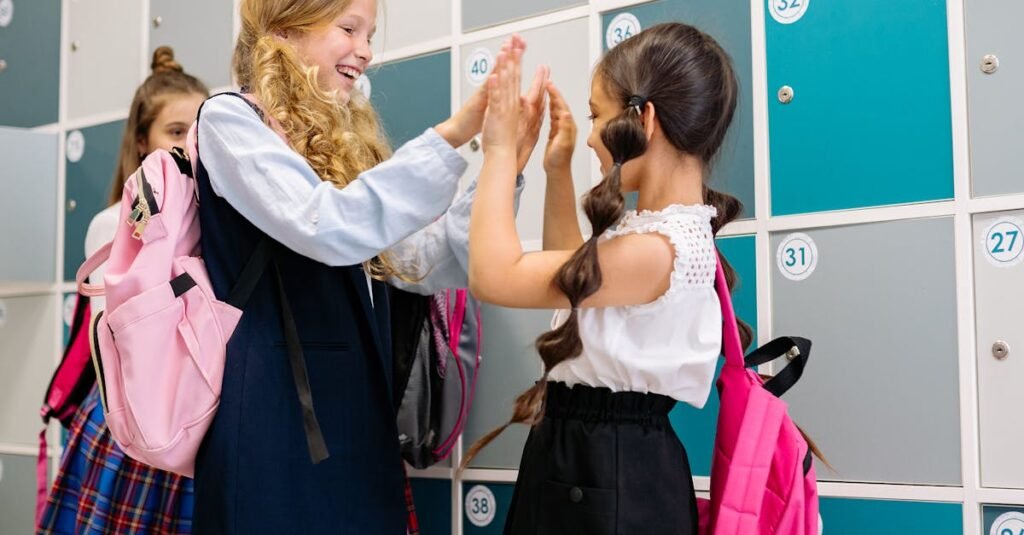“Is it too early to start counting down to August 29th?” summer camps at MRSports Belfast – summer camps Belfast
Here’s why summer camps are great: Check us out MR Sports camps and see for yourself. Kids summer holidays.
- Promotes Independence and Self-Reliance: kids summer holidays!
- Being away from home, even for a day camp, encourages children to manage their own belongings, make choices about activities, and navigate new routines.
- They learn to solve problems on their own, fostering a sense of self-reliance and boosting their self-esteem. This newfound independence is crucial for their overall development.
- Boosts Social Skills and Friendship Building: kids summer holidays
- Camps bring together children from diverse backgrounds and different schools, providing a rich environment for social interaction.
- Kids learn to communicate effectively, share, compromise, and resolve conflicts through team-based activities and group living.
- They make new friends, often forming strong bonds over shared experiences, which can significantly reduce feelings of loneliness and isolation.
- Encourages Physical Activity and Outdoor Engagement: kids summer holidays, belfast fun sports
- In an age where screen time can dominate, summer camps offer a much-needed antidote by emphasizing physical activity.
- They provide ample opportunities for running, jumping, swimming, playing sports, and exploring nature (e.g., hiking, scavenger hunts).
- This not only improves physical health, coordination, and stamina but also boosts mood, reduces stress, and lays the foundation for healthy habits.
- Stimulates Creativity and Explores New Interests: kids summer holidays, belfast fun sports
- Camps expose children to a wide array of activities they might not encounter in school, from archery and drama to coding, arts and crafts, and various sports.
- This broadens their horizons, ignites curiosity, and can spark lifelong passions. Creative activities also encourage imagination and healthy emotional expression.
- Builds Resilience and Confidence: kids summer holidays, belfast fun sports
- At camp, children face new challenges and opportunities to step out of their comfort zones. Whether it’s mastering a new skill, participating in a talent show, or working through a team challenge, overcoming these obstacles builds a sense of accomplishment.
- Learning to persevere through setbacks and adapt to new situations helps them develop emotional resilience and a positive mindset.
- Provides Positive Role Models: kids summer holidays
- Camp counselors are often energetic young adults who serve as positive mentors. They can be more relatable than parents or teachers, providing a different kind of guidance and inspiring children by example.
- Offers a Break from Technology: kids summer holidays
- Many camps have policies that limit or prohibit screen time, giving children a refreshing break from digital distractions. This encourages them to engage with the real world, fostering creativity and problem-solving skills without relying on devices.
- Creates Lasting Memories: kids summer holidays, belfast fun sports!
-
- Summer camp experiences are often filled with unique adventures, shared laughter, and new discoveries that create cherished, lifelong memories.
In essence, summer camps provide a well-rounded, stimulating, and supportive environment where children can thrive physically, socially, emotionally, and creatively during their time off from school.
Here are some links from NHS and related reputable sources that explain why it’s beneficial for children to have breaks from screen time:
- Screen Time – NHS Greater Glasgow and Clyde (NHSGGC): This page highlights how excessive screen time can displace opportunities for positive activities like socializing, exercise, and sleep. It notes that children who spend less time watching TV in early years tend to do better in school, have healthier diets, and are more physically active. https://www.nhsggc.scot/your-health/public-health/health-improvement/glasgow-city-hscp-health-improvement/children-and-young-people/screen-time/
- Effects of screen time on health – NHS Tayside: This resource explains that research shows children with higher screen time are more likely to have a less healthy diet, be above a healthy weight range, experience low mood, have sleep issues, and be less fit and active. https://www.nhstayside.scot.nhs.uk/OurServicesA-Z/NutritionandDieteticService/PROD_358877/index.htm
- Screen time for your child – NHS Forth Valley: This guide emphasizes that children learn best from real-life experiences and interaction, and too much screen time can reduce these opportunities. It lists possible risks like less time for learning, disrupted play, negative impact on concentration, irregular sleep patterns, and increased risk of childhood obesity. https://nhsforthvalley.com/wp-content/uploads/2017/01/Screen-Time.pdf
- Babies need humans, not screens | UNICEF Parenting: While not directly NHS, UNICEF is a highly reputable health organization. This article explains how screens can hijack attention spans, curtail the ability to control impulses, and reduce empathy in young children, as real-life human interaction is crucial for their brain development. https://www.unicef.org/parenting/child-development/babies-screen-time
- Children and too much screen time – Mayo Clinic Health System: This article outlines various issues linked to excessive screen time, including obesity, irregular sleep, behavioral problems, impaired academic performance, and less time for active, creative play. https://www.mayoclinichealthsystem.org/hometown-health/speaking-of-health/children-and-screen-time
These resources collectively highlight that while screens can offer some benefits, excessive use can negatively impact children’s physical health, mental well-being, cognitive development, and social skills.
Here at MRSports we pride ourselves in helping young ones grow in confidence, skills. and help them entertain those wild imaginations they have! feel free to book Your slot!!


